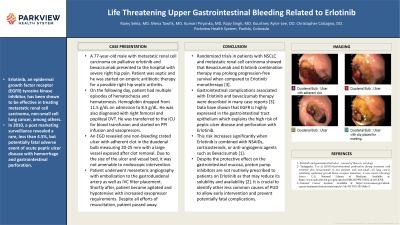Tuesday Poster Session
Category: GI Bleeding
P3504 - Life Threatening Upper Gastrointestinal Bleeding Related to Erlotinib
Tuesday, October 24, 2023
10:30 AM - 4:00 PM PT
Location: Exhibit Hall

Has Audio

Mena Tawfik, MD
Parkview Medical Center
Pueblo, CO
Presenting Author(s)
Ramy Sekla, MD, Mena Tawfik, MD, Kumari Piryanka, MD, Rajiv Singh, MD, Kourtney Aylor-Lee, DO, Christopher Calcagno, DO
Parkview Medical Center, Pueblo, CO
Introduction: Erlotinib, an epidermal growth factor receptor (EGFR) tyrosine kinase inhibitor, has been shown to be effective in treating metastatic renal cell carcinoma, non-small cell lung cancer, among others. In 2010, a post marketing surveillance revealed a rare, less than 4.5%, but potentially fatal adverse event of acute peptic ulcer disease with hemorrhage and gastrointestinal perforation.
Case Description/Methods: We present a case of a 77-year-old male with metastatic renal cell carcinoma on palliative Erlotinib and Bevacizumab who presented to the hospital with severe right hip pain. Patient was septic and he was started on empiric antibiotic therapy for a possible right hip septic arthritis. On the following day, patient had multiple episodes of hematochezia and hematemesis. Hemoglobin dropped from 11.5 g/dL on admission to 8.5 g/dL. He was also diagnosed with right femoral and popliteal DVT. He was transferred to the ICU for blood transfusion and started on PPI infusion and vasopressors. An EGD revealed one non-bleeding crated ulcer with adherent clot in the duodenal bulb measuring 20-25 mm with a large vessel exposed after clot removal. Due to the size of the ulcer and vessel bed, it was not amenable to endoscopic intervention. Patient underwent mesenteric angiography with embolization to the gastroduodenal artery as well as IVC filter placement. Shortly after, patient became agitated and hypotensive with increased vasopressor requirements. Despite all efforts of resuscitation, patient passed away.
Discussion: Randomized trials in patients with NSCLC and metastatic renal cell carcinoma showed that Bevacizumab and Erlotinib combination therapy may prolong progression-free survival when compared to Erlotinib monotherapy. Gastrointestinal complications associated with Erlotinib and Bevacizumab therapy were described in many case reports. Data have shown that EGFR is highly expressed in the gastrointestinal tract epithelium which explains the high risk of peptic ulcer disease and perforation with Erlotinib. This risk increases significantly when Erlotinib is combined with NSAIDs, corticosteroids, or anti-angiogenic agents such as Bevacizumab. Despite the protective effect on the gastrointestinal mucosa, proton pump inhibitors are not routinely prescribed to patients on Erlotinib as that may reduce its solubility and availability. It is crucial to identify other less common causes of PUD to allow early intervention and prevent potentially fatal complications.
Disclosures:
Ramy Sekla, MD, Mena Tawfik, MD, Kumari Piryanka, MD, Rajiv Singh, MD, Kourtney Aylor-Lee, DO, Christopher Calcagno, DO. P3504 - Life Threatening Upper Gastrointestinal Bleeding Related to Erlotinib, ACG 2023 Annual Scientific Meeting Abstracts. Vancouver, BC, Canada: American College of Gastroenterology.
Parkview Medical Center, Pueblo, CO
Introduction: Erlotinib, an epidermal growth factor receptor (EGFR) tyrosine kinase inhibitor, has been shown to be effective in treating metastatic renal cell carcinoma, non-small cell lung cancer, among others. In 2010, a post marketing surveillance revealed a rare, less than 4.5%, but potentially fatal adverse event of acute peptic ulcer disease with hemorrhage and gastrointestinal perforation.
Case Description/Methods: We present a case of a 77-year-old male with metastatic renal cell carcinoma on palliative Erlotinib and Bevacizumab who presented to the hospital with severe right hip pain. Patient was septic and he was started on empiric antibiotic therapy for a possible right hip septic arthritis. On the following day, patient had multiple episodes of hematochezia and hematemesis. Hemoglobin dropped from 11.5 g/dL on admission to 8.5 g/dL. He was also diagnosed with right femoral and popliteal DVT. He was transferred to the ICU for blood transfusion and started on PPI infusion and vasopressors. An EGD revealed one non-bleeding crated ulcer with adherent clot in the duodenal bulb measuring 20-25 mm with a large vessel exposed after clot removal. Due to the size of the ulcer and vessel bed, it was not amenable to endoscopic intervention. Patient underwent mesenteric angiography with embolization to the gastroduodenal artery as well as IVC filter placement. Shortly after, patient became agitated and hypotensive with increased vasopressor requirements. Despite all efforts of resuscitation, patient passed away.
Discussion: Randomized trials in patients with NSCLC and metastatic renal cell carcinoma showed that Bevacizumab and Erlotinib combination therapy may prolong progression-free survival when compared to Erlotinib monotherapy. Gastrointestinal complications associated with Erlotinib and Bevacizumab therapy were described in many case reports. Data have shown that EGFR is highly expressed in the gastrointestinal tract epithelium which explains the high risk of peptic ulcer disease and perforation with Erlotinib. This risk increases significantly when Erlotinib is combined with NSAIDs, corticosteroids, or anti-angiogenic agents such as Bevacizumab. Despite the protective effect on the gastrointestinal mucosa, proton pump inhibitors are not routinely prescribed to patients on Erlotinib as that may reduce its solubility and availability. It is crucial to identify other less common causes of PUD to allow early intervention and prevent potentially fatal complications.
Disclosures:
Ramy Sekla indicated no relevant financial relationships.
Mena Tawfik indicated no relevant financial relationships.
Kumari Piryanka indicated no relevant financial relationships.
Rajiv Singh indicated no relevant financial relationships.
Kourtney Aylor-Lee indicated no relevant financial relationships.
Christopher Calcagno indicated no relevant financial relationships.
Ramy Sekla, MD, Mena Tawfik, MD, Kumari Piryanka, MD, Rajiv Singh, MD, Kourtney Aylor-Lee, DO, Christopher Calcagno, DO. P3504 - Life Threatening Upper Gastrointestinal Bleeding Related to Erlotinib, ACG 2023 Annual Scientific Meeting Abstracts. Vancouver, BC, Canada: American College of Gastroenterology.
